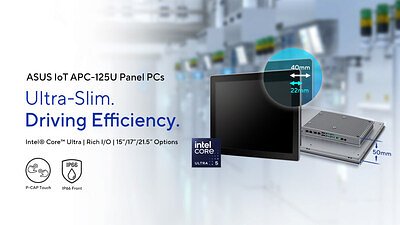
Slim PCs Power Smarter Factories: ASUS IoT Drives Edge Computing with New Panel Series
ASUS IoT’s APC-125U series tackles space constraints and energy demands in modern industrial automation, pushing processing power to the edge for faster, more efficient operations.
Slim PCs Power Smarter Factories: ASUS IoT Drives Edge Computing with New Panel Series
Taipei, Taiwan – The relentless drive for automation and data-driven insights in manufacturing is reshaping factory floors, demanding increasingly sophisticated and adaptable technology. ASUS IoT is responding with the launch of its APC-125U series of ultra-slim industrial panel PCs, a move that signals a broader industry trend towards edge computing and energy efficiency. These compact powerhouses are designed to bring processing closer to the point of operation, enabling real-time control, reduced latency, and significant energy savings.
Traditionally, industrial PCs have been bulky, power-hungry devices. But the APC-125U series challenges that notion with its fanless design, IP66-rated durability, and integration of the latest Intel Core Ultra processors. Available in 15-, 17-, and 21.5-inch sizes, these panel PCs are engineered for space-constrained environments while delivering impressive performance.
“The demand for rugged, compact, and powerful industrial PCs is growing rapidly,” explains a source within the industrial automation sector. “Manufacturers are looking for solutions that can withstand harsh conditions, integrate seamlessly into existing infrastructure, and deliver the performance needed to support advanced applications like machine vision and predictive maintenance.”
Pushing Processing to the Edge
The APC-125U series is particularly notable for its embrace of edge computing. By bringing processing power closer to the source of data – whether it’s a robotic arm, a conveyor belt, or a sensor network – manufacturers can dramatically reduce latency and improve response times. This is crucial for applications that require real-time control, such as automated assembly lines and quality control systems.
“Edge computing is no longer a buzzword; it’s a necessity,” says an analyst specializing in industrial automation. “The amount of data generated by modern factories is overwhelming. Sending all that data to the cloud for processing is simply not feasible. You need to process data locally to make quick decisions and keep operations running smoothly.”
Integrating Intel’s Arc graphics, the new PCs aren’t just aimed at traditional control applications. Their processing power allows for increasingly sophisticated visual inspection systems using AI and machine learning. “We're seeing a convergence of IT and OT [Operational Technology],” notes a source familiar with factory digitization initiatives. “The PCs need to be capable of handling both traditional control tasks and more demanding applications like image processing and data analytics.”
Energy Efficiency: A Growing Priority
Beyond performance, energy efficiency is becoming a major concern for manufacturers. Rising energy costs and growing environmental awareness are driving demand for more sustainable industrial solutions. The APC-125U series addresses this need with its fanless design and low-power Intel Core Ultra processors.
“Manufacturers are under increasing pressure to reduce their carbon footprint,” explains an environmental consultant working with industrial clients. “Energy efficiency is one of the easiest ways to achieve this. By switching to more efficient hardware, companies can significantly reduce their energy consumption and lower their operating costs.”
ASUS IoT claims the APC-125U series delivers up to 20% lower power consumption compared to previous generations. While independent verification of these claims is ongoing, the fanless design itself represents a significant step towards energy efficiency. Traditional industrial PCs rely on fans to dissipate heat, which consume a considerable amount of energy.
Addressing the Legacy Factory Challenge
One of the biggest challenges facing manufacturers today is the integration of new technology into existing infrastructure. Many factories are decades old and have limited space and power capacity. The compact size and low-power design of the APC-125U series make it well-suited for retrofitting these legacy environments.
“Space is always at a premium in factories,” says a plant manager overseeing a modernization project. “We need solutions that can fit into tight spaces without disrupting existing operations. The slim profile of these panel PCs is a major advantage.”
However, seamless integration isn’t always straightforward. Connecting new devices to older control systems requires careful planning and expertise. Compatibility issues and security vulnerabilities are common concerns.
“You need to ensure that the new devices are properly integrated with the existing network and that they don’t create any security risks,” explains a cybersecurity specialist working with industrial clients. “Proper configuration and monitoring are essential.”
The Future of Industrial Computing
The launch of the APC-125U series is indicative of a broader trend towards smaller, more efficient, and more powerful industrial computers. As manufacturers continue to embrace automation, edge computing, and sustainability, the demand for these types of solutions is only expected to grow.
“The future of industrial computing is all about bringing processing closer to the source of data,” says an industry analyst. “Edge computing is enabling manufacturers to make faster, more informed decisions, improve efficiency, and reduce costs. The APC-125U series is a step in the right direction.”
The move by ASUS IoT to offer a solution that addresses multiple key industry concerns positions them well to capitalize on this growing demand. While challenges remain in integrating new technology into legacy environments, the benefits of edge computing and energy efficiency are simply too compelling to ignore. The APC-125U series represents a significant step towards a smarter, more sustainable, and more efficient future for manufacturing.
